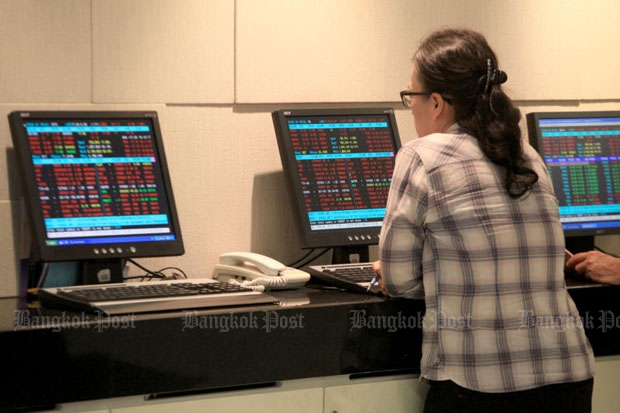
Thailand's economy may have struggled to gain momentum this year but the country's stock market was the best performer in Southeast Asia and second-best in all of Asia Pacific.
The Stock Exchange of Thailand finished the year on Friday at 1,542.94 points, representing a gain of 19.8% from 1,288.02 at the end of 2015. Over the past 52 weeks the index traded in a range between 1,220.96 and 1,558.32 points.
On Friday the SET Index advanced 5.13 points to close 2.2% higher than at the end of the previous week. Turnover was thin at 36.68 billion baht as investors headed off for the New Year holiday. The market will reopen on Wednesday. Friday was the sixth straight day of gains as investors have been encouraged by improving economic indicators, including November exports that were well above forecasts.
The 2016 closing was the highest year-end mark in 23 years. The SET ended 1993 at 1,682.85 points and recorded its all-time high of 1,789.16 a week later, on Jan 5, 1994.
In Asia Pacific, only the Karachi Stock Exchange in Pakistan, with a gain of 45.3%, has performed better than Thailand in 2016. And only one other bourse in the region, Jakarta (15.4%), recorded a double-digit advance.
The MSCI Asia Pacific Index finished 2016 up 2.3%, its first annual gain since 2013. The Dow Jones Asia-Pacific Total Stock Market (TSM) Index of 20 regional markets was up 2.1% for the year.
The SET has struggled to sustain gains in recent years, however. The improved showing this year followed a decline of 14% in 2015. That was preceded by a gain of 15.3% in 2014, a loss of 6.7% in 2013 and a gain of 35.7% in 2012.
The market capitalisation of the SET has risen steadily this year, reaching 14.74 trillion baht at the end of November compared with 12.2 trillion at the end of 2015. Average daily trading turnover was valued at 50.6 billion baht in the first 11 months, compared with 41.1 billion for all of 2015.
Foreign investors were net buyers of 77.93 billion baht worth of Thai shares over the course of the year, and brokers were net buyers of 25.37 billion. Local institutional investors were net sellers of 8.65 billion baht, and retail investors sold 94.64 billion more than they bought.
Among the other top-performing stock exchanges in the world this year were Caracas (up 113.9% through Thursday), Cairo (76.2%), Moscow (51.1%), Buenos Aires (44.9%), Sao Paulo (38.9%) and Budapest (33.9%).
The baht, meanwhile, ended the year little changed from 35.98/36.00 to the US dollar at the end of 2015. It was trading on Friday in Bangkok around 35.95.
The continued strength of the dollar and expectations of a faster pace of US interest rates in 2017 resulted in losses for most Asian currencies in 2016.
The Chinese yuan was the worst performer among major Asian currencies, down nearly 6.6%, its biggest annual fall since Beijing established its foreign-exchange market in 1994.
The decline in the yuan mirrors the poor performance of Chinese equities this year, with the Shanghai Composite down 12.5% through Thursday.
The Taiwan dollar was the region's best performer with a rise of 2.7%, helped by large foreign investor inflows into Taiwanese equities.
|
Most active by value, Dec 30 |
|||
|
|
Close |
Change |
|
|
Baht |
% |
||
|
PTT |
372.00 |
-3.00 |
-0.80 |
|
GL |
57.25 |
+4.25 |
+8.02 |
|
CPALL |
62.50 |
+0.50 |
+0.81 |
|
BANPU |
19.20 |
+0.30 |
+1.59 |
|
SCB |
152.50 |
+1.50 |
+0.99 |